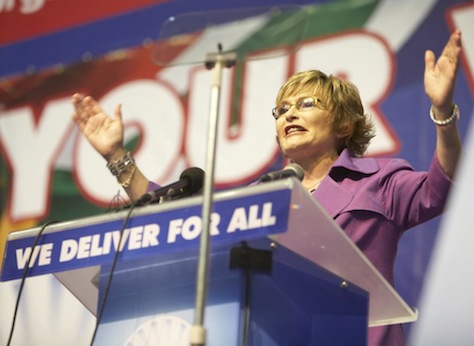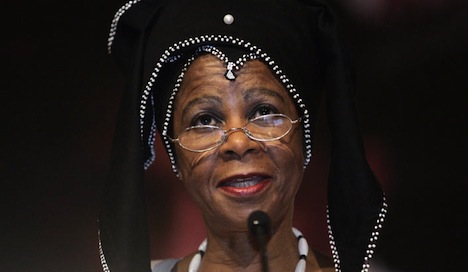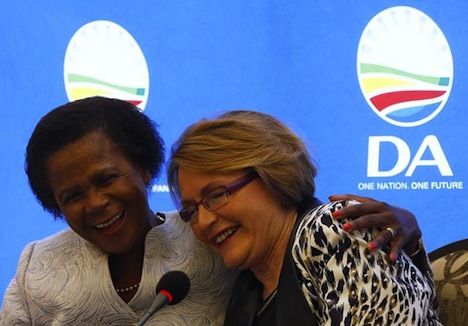Less than a week after anti-apartheid activist Mamphela Ramphele became the presidential candidate of the Democratic Alliance (DA), the second-largest political party in South Africa, Ramphele on Sunday backed out of her decision to lead the South African opposition into expected spring parliamentary elections.![]()
Though the deal would have merged the DA with Ramphele’s smaller party, AgangSA, founded just over a year ago, the merger collapsed over whether AgangSA would remain a separate entity or would be collapsed entirely within the Democratic Alliance.
It’s a short-sighted decision that leaves neither Ramphele nor Helen Zille (pictured above), the leader of the Democratic Alliance and premier of Western Cape province, looking very skilful. The collapse of the Ramphele-led alliance must surely rank among the worst self-inflicted disasters of recent world politics.
Zille, in particular, released a harshly worded statement late Sunday savaging Ramphele:
“This about-turn will come as a disappointment to the many South Africans who were inspired by what could have been a historic partnership,” Zille said. “By going back on the deal, again… Dr Ramphele has demonstrated – once and for all – she cannot be trusted to see any project through to its conclusion. This is a great pity.”
Insisting that the DA had negotiated with Ramphele in good faith, Zille added: “Since Tuesday’s announcement, Dr Ramphele has been playing a game of cat and mouse – telling the media one thing, Agang supporters another thing, and the DA another. “It is not clear what her objective is, but whatever it is, it is not in the interests of the South African people.”
Without Ramphele, the Democratic Alliance seemed set for its most successful election since its foundation in 2000. Zille won 16.7% of the vote in the previous April 2009 elections, 23.9% of the national vote in May 2011 municipal elections, and the party seemed headed to win one-quarter or even one-third of the vote in the upcoming parliamentary elections. Though Zille has a hold on Western Cape province, party leaders hope to make breakthroughs in Eastern Cape and Northern Cape provinces, as well as in Gauteng province, where former Johannesburg mayoral candidate and city council member Mmusi Maimane has helped transform the party’s local (and national) image.
That won’t necessarily change because of the tumultuous courtship with Ramphele and AgangSA, but it doesn’t make Zille look like an incredibly strong leader to hand her party’s presidential nomination to someone who flaked out within hours of receiving it. South Africa’s election must be held before July 2014, and if it takes place closer to July than, say, to April or May, the Ramphele breakup stands a good chance of receding into the background. But it also means that, barring a major turn of events, Zille will have to recalibrate expectations from ‘historic breakthrough’ back down to incremental gains. Continue reading Ramphele debacle leaves South African opposition reeling


